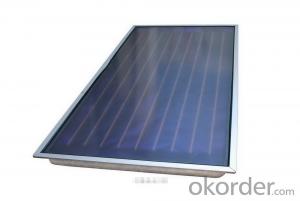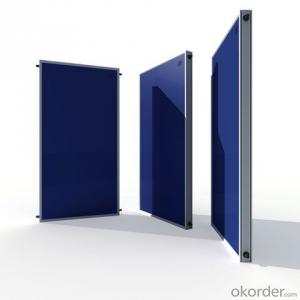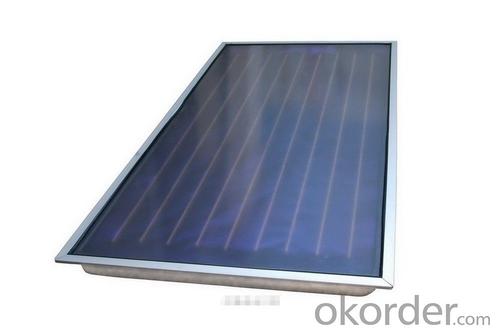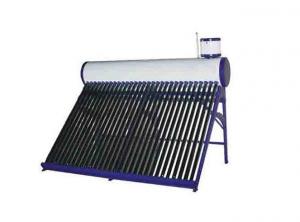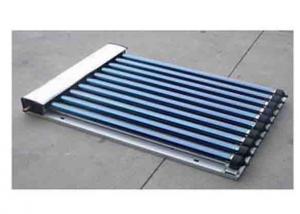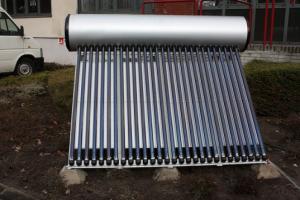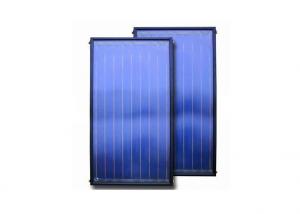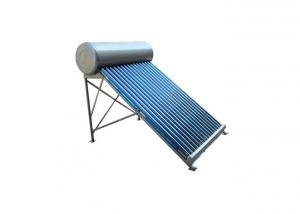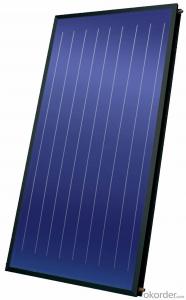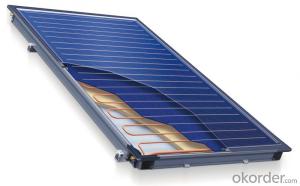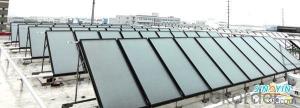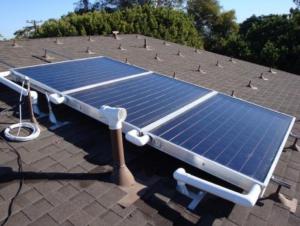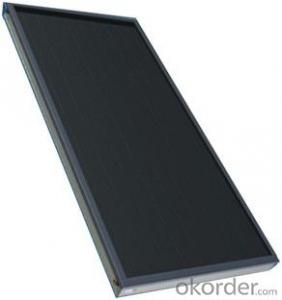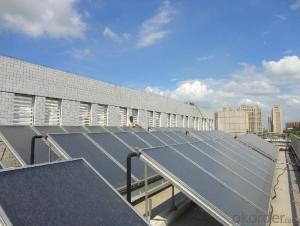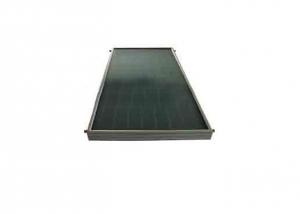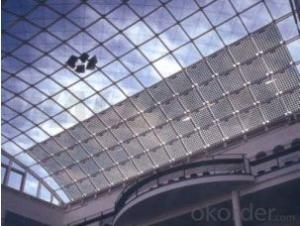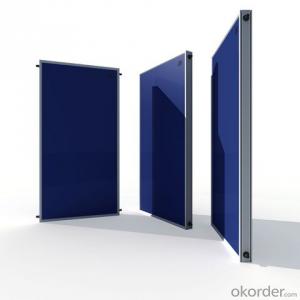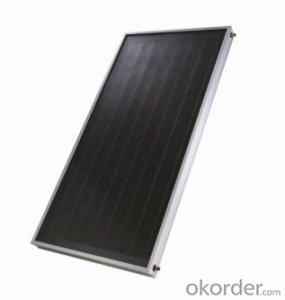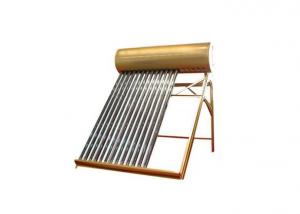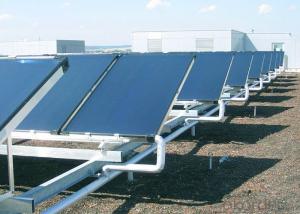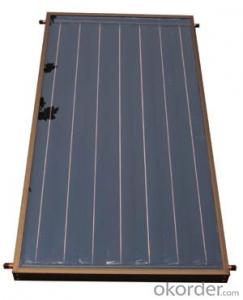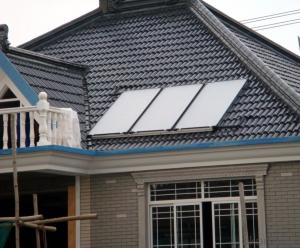Black Chrome Flat Panel Pool Solar Collectors
- Loading Port:
- Shanghai
- Payment Terms:
- TT OR LC
- Min Order Qty:
- 500 pc
- Supply Capability:
- 10000 pc/month
OKorder Service Pledge
OKorder Financial Service
You Might Also Like
Specifications
Flat panel solar thermal collector
Low iron tempered glass
Core: all Copper, ultrasonic welding.
Coating: black chrome
Flat panel solar thermal collector
consist of glazed, flat, dark surfaced absorber plate which contains copper tubing. The Plate absorbs incoming solar heat energy and the casing minimises heat loss. A fluid is circulated through the tubing and this fluid heats up as it passes by the absorber plate.
Feature:
1) Absorptance: ≥95%±2%.
2) Material:thickness:low iron rohbic tempered glass x thickness: 3.2mm.
3) Glass sheet size: 1988×988 mm.
4) Glass transmittance: 87%~91%.
6) Insulation material:Rock wool.
7) Back sheet material: Zincification plate0.3mm; embosseo Aluminum0.5mm.
8) Cross area: 2 m2.
9) Heat absorber area: 1.8 m2.
10) Fluid content: 2L.
11) Maximumpressure: 1 Mpa.
12) Operation temperature: -40~150°C.
Flat Plate Collectors
Flat plate collectors are the most common solar thermal collectors. They are most appropriate for low temperature applications, such as domestic hot water heating. Flat plate series water heaters maximizes solar heat gain, minimizes heat losses, and provides for the most efficient heat transfer from absorber plate to tube.
Flat Plate Solar Collectors are a glazed collectors which
feature a coating which maximizes heat absorption, aluminum framing which can withstand heavy weight and is weather resistant, and interior fiberglass insulation which allows for greater efficiency. The combination the latest energy efficiency technology and a strong heat exposure allow for optimal heat transfer and makes these lights the highest in BTU performance.
An important asset of flat plate solar collectors is their versatility. Their excellent efficiency makes them also suitable for the operation of larger systems for commercial or public use. Solar Flat Plate collectors are typically recommend for use in warmer climates simply because they are designed with larger absorber areas that are not insulated from the colder weather.
- Q: Can solar collectors be used in remote locations?
- Yes, solar collectors can be used in remote locations. One of the key advantages of solar energy is its ability to generate power in areas that are off the grid or far away from traditional power sources. Solar collectors can be installed in remote locations to harness sunlight and convert it into electricity, providing a sustainable and reliable source of power.
- Q: What is the maintenance cost of a solar collector system?
- The maintenance cost of a solar collector system can vary depending on the type and size of the system, as well as the specific components used. Generally, the maintenance cost is relatively low as solar collectors have few moving parts and require minimal upkeep. However, occasional inspections, cleaning, and possible component replacements may be necessary, which can incur some expenses. It is recommended to consult with a professional installer or manufacturer for accurate estimates of the maintenance cost based on the specific solar collector system in question.
- Q: Can solar collectors be used in combination with solar tracking systems?
- Yes, solar collectors can be used in combination with solar tracking systems. Solar collectors are designed to capture and convert sunlight into usable energy, while solar tracking systems are used to maximize the amount of sunlight received by adjusting the position of the solar panels or collectors throughout the day. By combining these two technologies, the efficiency and output of a solar energy system can be significantly increased. Solar tracking systems work by following the movement of the sun and adjusting the angle and orientation of the solar collectors accordingly. This allows the collectors to capture sunlight at its optimal angle, maximizing the amount of energy that can be generated. The ability to track the sun throughout the day ensures that the solar collectors are always positioned to receive the maximum amount of sunlight available. In combination with solar tracking systems, solar collectors can enhance the overall performance of a solar energy system. They can be used in various applications, such as solar thermal collectors for heating water or air, or photovoltaic (PV) panels for generating electricity. By utilizing both solar collectors and solar tracking systems, the energy output can be increased, making the system more efficient and cost-effective. However, it is important to note that the implementation of solar tracking systems may come with additional costs and maintenance requirements. The moving parts and mechanisms involved in tracking the sun's movement need to be carefully maintained to ensure proper functioning. Additionally, the increased efficiency offered by solar tracking systems may not always justify the additional investment, especially in regions with high solar irradiance throughout the year. In conclusion, solar collectors can indeed be used in combination with solar tracking systems to maximize the efficiency and energy output of a solar energy system. However, the decision to incorporate solar tracking should be carefully evaluated based on the specific needs, location, and cost-effectiveness of the project.
- Q: Can solar collectors be used in solar thermal cooling?
- Solar thermal cooling systems have the ability to utilize solar collectors for their operation. These collectors, such as flat plate or evacuated tube collectors, capture the sun's radiation and convert it into heat energy. This heat energy can then be utilized to power a thermally-driven cooling system like an absorption or adsorption chiller. When implementing a solar thermal cooling system, the solar collectors are typically connected to a heat transfer fluid, which can be water or a specialized fluid. This fluid absorbs the heat from the sun and is subsequently employed to drive the cooling process in the chiller system. The chiller system, powered by the solar collectors, effectively cools the air or fluid utilized in the cooling system. The use of solar collectors in solar thermal cooling systems results in reduced or eliminated reliance on traditional electricity for cooling purposes. This leads to significant energy and cost savings. Moreover, solar thermal cooling systems have lower greenhouse gas emissions compared to conventional cooling systems, making them an environmentally friendly option. However, it is important to consider that solar thermal cooling systems may have limitations in terms of their cooling capacity. Additionally, they require sufficient sunlight to operate optimally. Factors such as system design, climate conditions, and energy storage solutions must also be taken into account to effectively utilize solar collectors in solar thermal cooling.
- Q: Can solar collectors be used for generating electricity on robots?
- Robots can indeed utilize solar collectors to generate electricity. Solar collectors, which are also referred to as solar panels or photovoltaic cells, have the capability to convert sunlight into electrical energy. By mounting these panels onto the surface of a robot, it becomes capable of harnessing solar energy and utilizing it to power various functions and systems. This renewable energy source proves to be particularly beneficial for robots that operate in remote or off-grid areas where access to conventional power sources is limited. The applications of solar-powered robots are diverse, encompassing exploration, surveillance, agriculture, and even domestic tasks. Furthermore, advancements in solar technology have resulted in more efficient and compact solar panels, thus making them an increasingly feasible option for providing power to robots.
- Q: What is the effect of saltwater exposure on solar collectors?
- Saltwater exposure can have a detrimental effect on solar collectors. The corrosive nature of saltwater can cause damage to the surface coatings and materials used in solar collectors, leading to reduced efficiency and potential system failure over time. Regular maintenance and protective measures are necessary to mitigate the negative impact of saltwater exposure on solar collectors.
- Q: What are the advantages of using solar collectors?
- There are several advantages of using solar collectors. Firstly, solar collectors harness clean and renewable energy from the sun, reducing our reliance on fossil fuels and decreasing greenhouse gas emissions. Additionally, solar collectors provide a free source of energy, reducing electricity costs in the long run. They require minimal maintenance and have a long lifespan, making them a cost-effective investment. Moreover, solar collectors can be installed in remote areas, providing electricity to communities without access to power grids. Finally, solar collectors contribute to energy independence, as they allow individuals and businesses to generate their own electricity and reduce dependence on external energy sources.
- Q: How do solar collectors affect the resale value of a property?
- Solar collectors can positively impact the resale value of a property. They offer potential energy savings, increase the property's attractiveness to eco-conscious buyers, and may even qualify for government incentives. However, the actual effect on resale value depends on factors like the location, quality, and age of the solar collectors, as well as the overall demand for renewable energy in the area.
- Q: Are solar collectors compatible with existing heating systems?
- Yes, solar collectors are compatible with existing heating systems. They can be integrated into various heating systems such as radiant floor heating, forced air systems, and even traditional boilers. The solar collectors help supplement the existing heating system by providing renewable energy and reducing the reliance on fossil fuels.
- Q: Are solar collectors suitable for large-scale energy production?
- Yes, solar collectors are suitable for large-scale energy production. They have the potential to generate a significant amount of electricity when installed in large numbers, especially in regions with ample sunlight. With advancements in technology and decreasing costs, solar collectors are becoming more efficient and cost-effective, making them an increasingly viable option for large-scale energy production.
Send your message to us
Black Chrome Flat Panel Pool Solar Collectors
- Loading Port:
- Shanghai
- Payment Terms:
- TT OR LC
- Min Order Qty:
- 500 pc
- Supply Capability:
- 10000 pc/month
OKorder Service Pledge
OKorder Financial Service
Similar products
Hot products
Hot Searches
Related keywords
